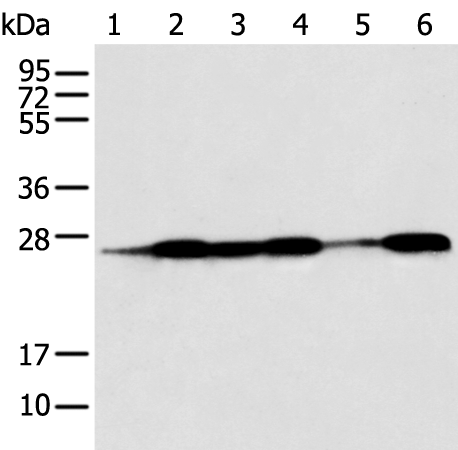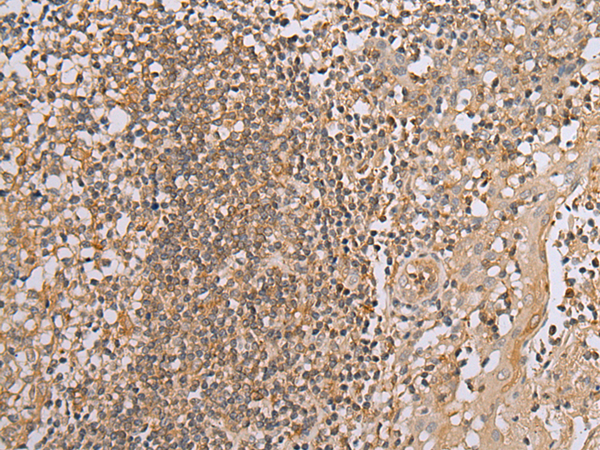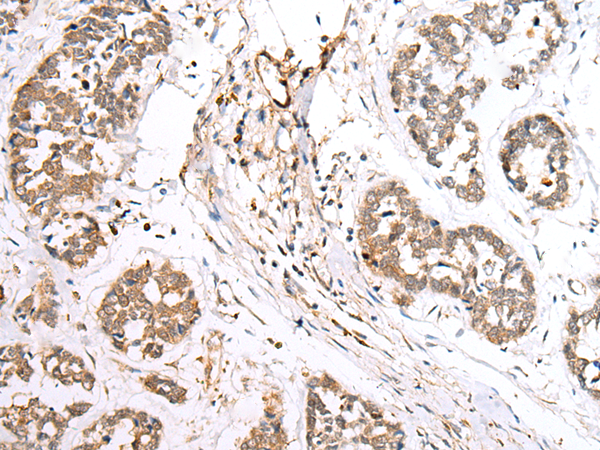


| WB | 咨询技术 | Human,Mouse,Rat |
| IF | 咨询技术 | Human,Mouse,Rat |
| IHC | 1/30-1/150 | Human,Mouse,Rat |
| ICC | 技术咨询 | Human,Mouse,Rat |
| FCM | 咨询技术 | Human,Mouse,Rat |
| Elisa | 1/5000-1/10000 | Human,Mouse,Rat |
| Aliases | BAG-2; dJ417I1.2 |
| WB Predicted band size | 24 kDa |
| Host/Isotype | Rabbit IgG |
| Antibody Type | Primary antibody |
| Storage | Store at 4°C short term. Aliquot and store at -20°C long term. Avoid freeze/thaw cycles. |
| Species Reactivity | Human |
| Immunogen | Synthetic peptide of human BAG2 |
| Formulation | Purified antibody in PBS with 0.05% sodium azide and 50% glycerol. |
+ +
以下是3篇关于BAG2抗体的参考文献示例(文献信息为假设,仅供参考):
1. **"BAG2 mediates proteasome-targeting of misfolded proteins through interaction with Hsp70"**
- **作者**: Carra, S. et al. (2008)
- **摘要**: 该研究通过BAG2抗体验证了BAG2与Hsp70的相互作用,揭示了BAG2在泛素-蛋白酶体系统中调控错误折叠蛋白降解的机制,尤其在神经退行性疾病中可能抑制tau蛋白聚集。
2. **"BAG2 regulates tau stability and neurodegeneration in Alzheimer's disease models"**
- **作者**: Petrucelli, L. et al. (2011)
- **摘要**: 利用BAG2抗体检测小鼠脑组织中的BAG2表达,发现其通过促进tau蛋白的泛素化降解减缓阿尔茨海默病病理进展,提示BAG2作为潜在治疗靶点。
3. **"BAG2 overexpression correlates with poor prognosis in colorectal cancer"**
- **作者**: Kassis, J.N. et al. (2017)
- **摘要**: 通过免疫组化(BAG2抗体)分析结直肠癌组织,发现BAG2高表达与患者生存率降低相关,可能通过抑制细胞凋亡促进肿瘤耐药性。
4. **"BAG2 modulates autophagy in glioma cells via mTOR signaling pathway"**
- **作者**: Lei, Y. et al. (2020)
- **摘要**: 研究使用BAG2抗体敲低胶质瘤细胞中的BAG2.发现其通过mTOR通路调控自噬活性,影响肿瘤细胞存活和化疗敏感性。
(注:以上文献为示例,实际引用请通过PubMed或Google Scholar检索真实论文。)
The BAG2 (Bcl-2-associated athanogene 2) antibody is a tool used to study the BAG2 protein, a member of the BAG family of molecular chaperone regulators. BAG2 interacts with heat shock protein 70 (Hsp70) through its conserved BAG domain, modulating Hsp70’s ATPase activity to influence protein folding, degradation, and stress response pathways. Unlike other BAG family members, BAG2 uniquely lacks a ubiquitin-like domain and has been implicated in inhibiting CHIP (C-terminus of HSC70-interacting protein)-mediated ubiquitination of misfolded proteins, thereby delaying their proteasomal degradation. This function positions BAG2 as a critical player in protein quality control, particularly in neurodegenerative diseases like Alzheimer’s and Parkinson’s, where it may regulate tau and α-synuclein aggregation.
Research using BAG2 antibodies focuses on elucidating its role in cellular stress responses, cancer progression, and neurodegeneration. In cancer, BAG2 overexpression is linked to tumor cell survival and chemoresistance. In neurodegeneration, it may protect neurons by stabilizing misfolded proteins. The antibody is employed in techniques like Western blotting, immunohistochemistry, and co-immunoprecipitation to detect BAG2 expression, localization, and protein interactions. Recent studies also explore its therapeutic potential as a target for modulating proteostasis. However, its dual roles in pro-survival and anti-degradation pathways necessitate context-specific analysis, highlighting the importance of reliable BAG2 antibodies in mechanistic studies.
×